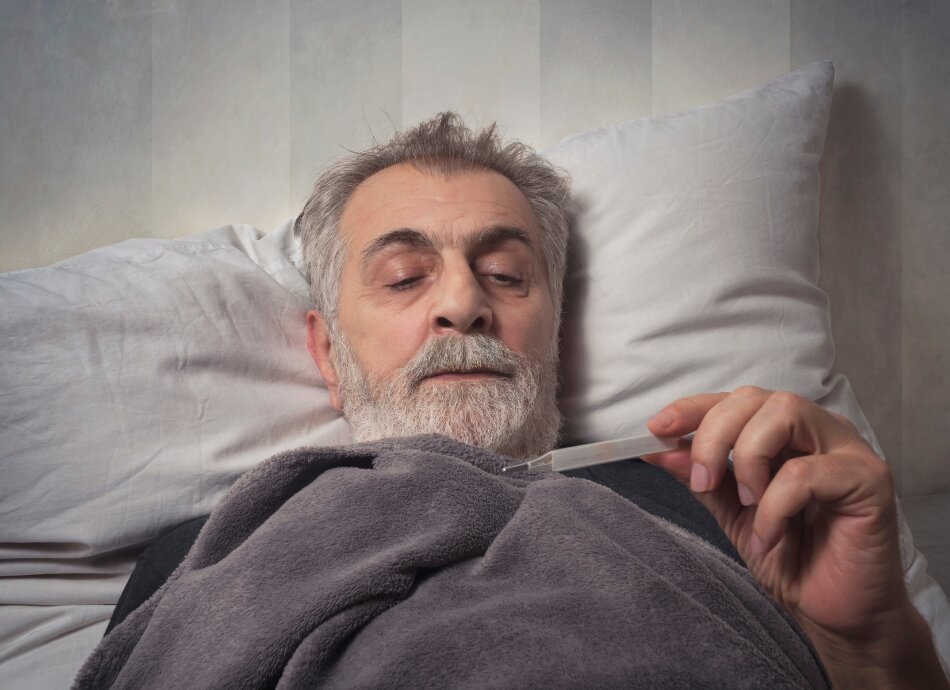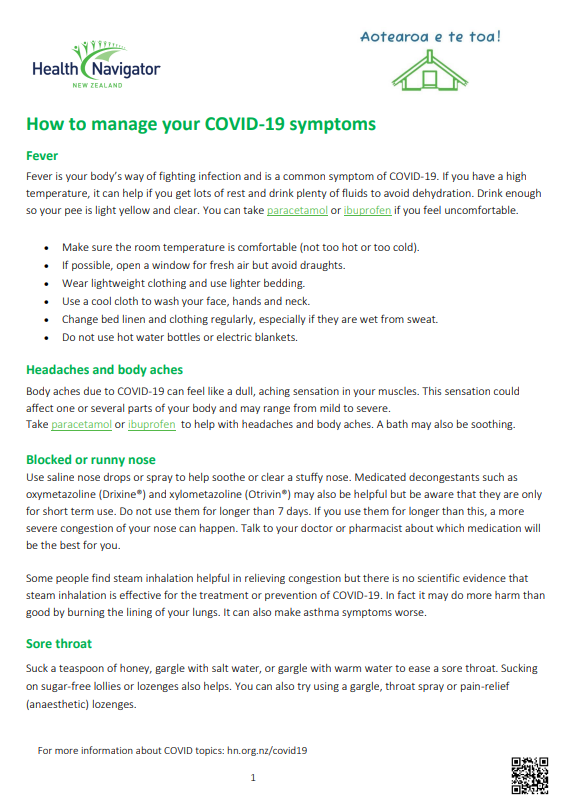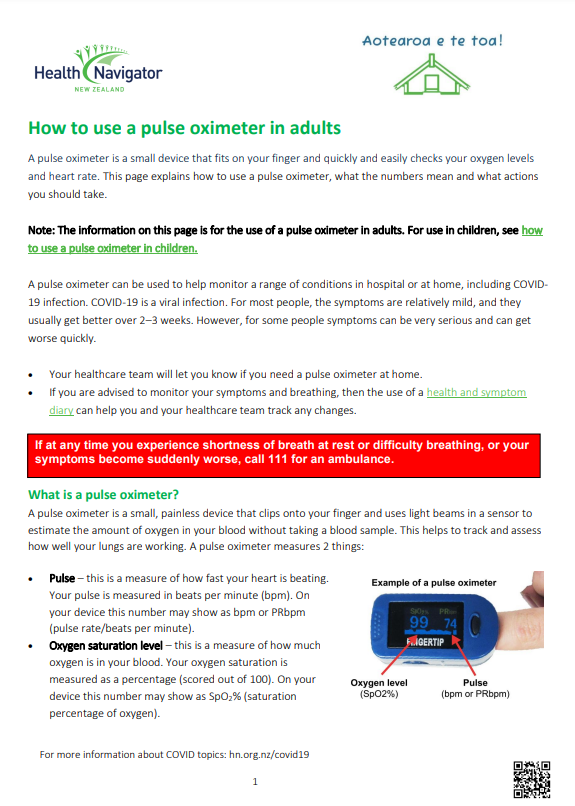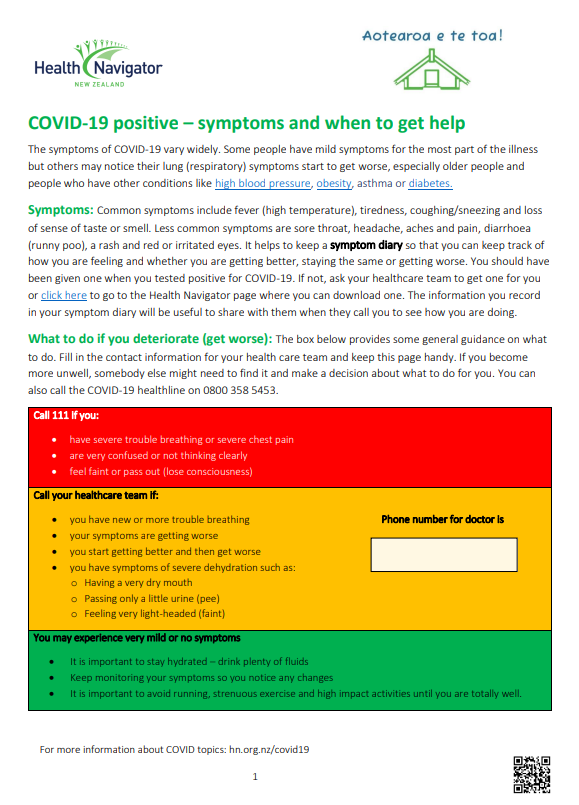COVID-19 positive: What do I do now?
Key points to know if you are COVID-19 positive
- If you or someone in your household have tested positive for COVID-19, this page provides a brief summary of some key things you need to know.
- It also includes steps you can take to look after yourself and your whānau.

There are free medicines available for people who are most at risk of severe illness with COVID-19. You need to start these within the first 5 days of developing COVID-19 symptoms.
If you test positive for COVID-19 and have other health issues or long-term conditions, talk to your GP, community pharmacy, or health care provider as soon as possible. They will advise if COVID-19 medicines are suitable for you. Read more about antiviral medicines for COVID-19 infection.
You are very infectious and to keep other people safe, it's recommended you stay at home for at least 5 days. If you can stay away from other people in your whare/home, do so. It will help to stop the spread of COVID-19 to your whānau. Watch the video below for some advice on stopping the spread of infection. It may take a few moments to load.
Video: How to reduce the spread of infection in your home
This video may take a few moments to load.
(Healthify He Puna Waiora, NZ, in partnership with Northland DHB & Ministry of Health, 2022)
This includes:
- Getting somebody to help with stocking up on food, medicines and other household supplies.
- You may be able to order supplies from your supermarket and ask a friend to collect them and deliver them to your gate.
- Your pharmacy may be able to arrange for medicines to be delivered, or you can ask a friend to pick them up for you.
- If you, or anybody isolating with you, is receiving help for personal care or disability support let any care givers know so that they can make a different plan for how to help now that you have COVID-19 in your household.
- If you have a child at school or day care, who needs to stay at home, talk to their teacher. They may be able to provide online learning or provide resources for your children.
If your symptoms are mild you will be able to manage them at home. Read more about how to manage your symptoms. It is a good idea to keep a symptom diary so that you can tell if they are getting worse. If your symptoms are more severe you may have more contact from a doctor or nurse, who may give you a pulse oximeter to keep track of your oxygen levels and heart rate.
Video: Managing your COVID symptoms
This video may take a few moments to load.
(Healthify He Puna Waiora, NZ, in partnership with Northland DHB & Ministry of Health, 2022)
Apps reviewed by Healthify
You may find it useful to look at some Self-management and healthy living apps, Breathing apps and Symptom trackers.
It is really important that you know when to get medical help.
Call 111 if you:
- have severe trouble breathing or severe chest pain
- are very confused or not thinking clearly
- feel faint or pass out.
Contact your doctor or nurse if:
- you have new or more trouble breathing
- your symptoms are getting worse
- you start getting better then get worse
- you have symptoms of dehydration – a very dry mouth, passing little urine (pee) or feeling very light-headed.
If your symptoms are very mild:
- it's important to stay hydrated – drink plenty of fluids
- keep monitoring/recording your symptoms so you notice any changes
- avoid vigorous exercise until you have recovered.
Video: COVID symptoms and when to seek medical advice
This video may take a few moments to load.
(Healthify He Puna Waiora, NZ, in partnership with Northland DHB & Ministry of Health, 2022)
Having COVID-19 is very stressful, even if you only have mild symptoms. Be kind to yourself and your family/whānau, and ask for help if you, or someone else, isn't coping.
Try to keep some routines in place, move about and get plenty of fresh air. Stay in touch with friends and whānau by phone or internet.
You can call Healthline 0800 611 116 for health advice or free call or text 1737 if you need to talk to somebody.
Apps
Self-management and healthy living apps
Breathing apps
Symptom trackers
Brochures
COVID-19 positive – how to manage your symptoms [PDF, 135 KB] Healthify He Puna Waiora, NZ, 2021
COVID-19 positive – how to use a pulse oximeter [PDF, 276 KB] Healthify He Puna Waiora, NZ, 2021
COVID-19 positive – stop the spread [PDF, 193 KB] Healthify He Puna Waiora, NZ, 2021
COVID-19 positive – symptoms and when to get help [PDF, 151 KB] Healthify He Puna Waiora, NZ, 2021
COVID-19 positive – what symptoms can I expect? [PDF, 203 KB] Healthify He Puna Waiora, NZ, 2021
Reference
- If you have COVID-19(external link) Health New Zealand | Te Whatu Ora, 2022
Brochures

Healthify He Puna Waiora, NZ, 2021

Healthify He Puna Waiora, NZ, 2021

Healthify He Puna Waiora, NZ, 2021
Credits: Healthify editorial team. Healthify is brought to you by Health Navigator Charitable Trust.
Page last updated:





